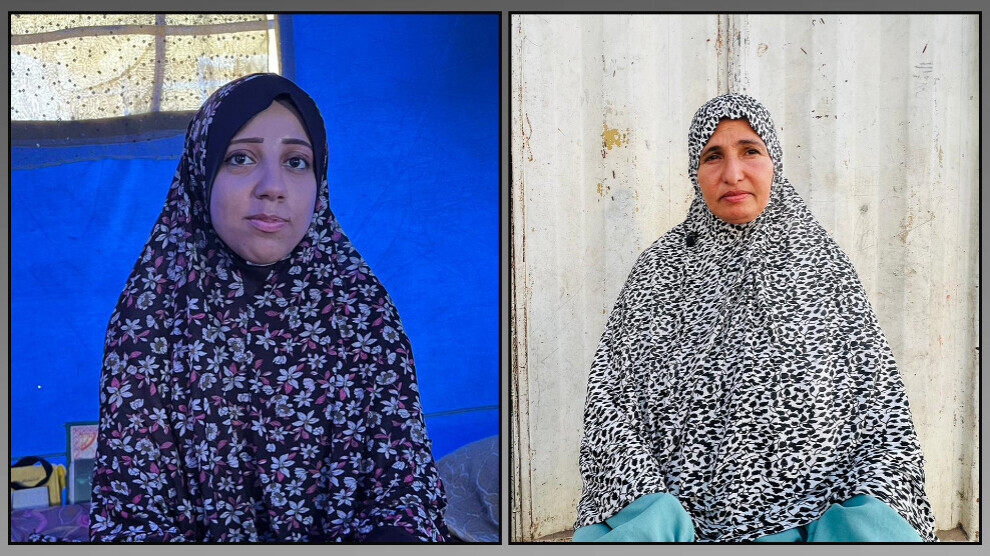Abandoned by UN, Gaza’s women face war alone
As Israel’s war on Gaza continues, testimonies reveal severe international neglect of women and children, left to endure blockade and daily suffering, abandoned to an uncertain fate.

Rafif Esleem
Gaza – In the midst of the ongoing genocide in the Gaza Strip, now in its second year, UN and human rights institutions have limited their role to sending small amounts of aid and issuing statements of condemnation against Israeli killings, starvation, and destruction. Women are left to face the war alone, disillusioned and disappointed, as no delegation from these institutions has visited displacement camps or checked on their conditions since the war began.
Cries from worn-out tents
Aida Marouf says the genocide in Gaza has been ongoing for two years, recalling how one of the most shocking actions by international institutions was abandoning women and children in northern Gaza for more than a year after they refused forced displacement. They were besieged, starved, and denied medical care, leaving women devastated after trusting in those institutions.
She added that even after international organizations returned to the southern part of the Strip, “not a single delegation came to visit the camps to see the reality of women, children, and girls firsthand. Instead, they only send aid that gets stolen and never reaches us. Children are killed on screens, and those who survive live on nothing—without food, water, education, or clothing. Childhood in the full sense of the word no longer exists here. Women’s conditions are no better.”
Palestinian women, she continued, wake up every morning unsure if they will survive another day, as the sound of constant airstrikes robs them of safety. “We expected organizations that claim to stand for humanity and human rights—like the United Nations and its affiliates—to fulfill their role by following up on women’s and children’s conditions and forcing Israeli forces to provide proper shelter.”
She added, “Today the tents have decayed under the sun after a year and a half and are no longer livable, while Israel continues to block humanitarian aid piled up at the border crossings.” She asked whether donor states would accept their own children sleeping on such mattresses, covered with such thin blankets, or deprived of basic hygiene supplies for women and girls.
Law fails Gaza, people suffer
Marouf said, “I was let down by Arab and foreign states alike, with their false claims that we are one nation. What kind of nation abandons its women to die on screen in this way?”
She questioned the value of international laws: “Why were they written if they cannot stop this madness? Every day, more children die from hunger and malnutrition.”
She added, “Why only Gaza? Every nation has experienced war, but it ended. Here, civilians who cannot defend themselves are burned in their tents or killed while searching for food. It is as if the world is telling us: leave life quietly, you are not human.”
Marouf called on international organizations to “step down from their ivory towers” and witness the reality facing women, children, and the elderly. “Let them practice the humanity they speak of at conferences and banquets. Israel’s obstruction cannot absolve them of blame—their silence has only empowered Israel to continue violating international agreements unchecked.”
She warned that conditions are already dire and will worsen with increased military pressure and threats of occupying Gaza City, urging the world to view the situation through the lens of humanity. “The global indifference to our suffering, especially regarding humanitarian aid, means dozens of deaths and injuries every day. Women receive no share of this aid.”
Humanitarian gap for women
Nada Awadallah also criticized the failure of UN and aid agencies in serving Gaza’s women. She said that about five months ago, she saw just one UN agency visit the camp, giving a small number of women hygiene kits, while the vast majority were left empty-handed.
Women’s needs vary from food, water, and supplements to hygiene products, she explained. Before the war, based on her work with some temporary projects, she believed international and women’s organizations would provide better support if attacks escalated. Instead, the reality shocked her: “Women were abandoned, and those institutions only deepened the chaos.”
Awadallah stressed that the UN and other international bodies must pressure Israel to allow the entry of withheld aid, especially items for women, “the most marginalized and vulnerable among civilians.”
